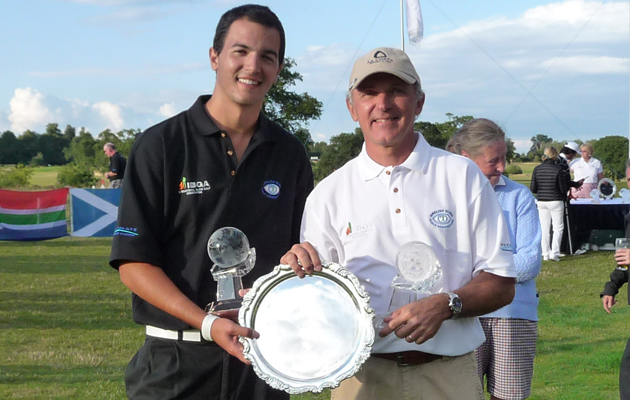Hole in One
A rare and currently incurable condition took Jeremy Poincenot's central vision less than three years ago, but he didnt let it derail his life.

These days, Jeremy Poincenot will tell you he doesn’t have a single complaint about his life.
Last August, the SDSU business management major, then 20 years old, ousted 59 competitors from 14 countries to win the International Blind Golf Association’s World Championships in Britain.
“I’m still waiting to get a call from Obama,” Poincenot said, laughing. “A congratulatory call.”
Since then, Poincenot — who became legally blind less than three years ago after contracting Leber’s hereditary optic neuropathy (LHON) — and his family were flown to China and Japan where he played in pro-am exhibition tournaments with high-profile golfers, including the captains of Europe’s Ryder Cup team.
“It’s a tough life,” Poincenot said, sarcastically.
No end in sight
Poincenot wasn’t always able to joke about LHON, a genetic, incurable condition that disables one’s central vision.
After contracting the disease at the end of 2008, he temporarily dropped out of SDSU and stopped playing golf. Poincenot was just about ready to give up on life as well.
“It was a total transition and one-eighty in my life,” he said. “I remember thinking, ‘I don’t want to go to school, I don’t want to do anything.’
“I was probably suicidal.”
“You’re going to face challenges in your life and it’s how you handle them that makes you who you are.”
The comeback
The following year, his mother discovered the United States Blind Golf Association (USBGA), which sponsors several nationwide tournaments each year. Poincenot was skeptical at first, but he decided to give it a shot and competed in his first tournament that September.
“I went from thinking there was no chance I could play blind golf, to finding out people do play blind golf, to kind of being in denial that I wanted to do it,” recalled Poincenot, who played competitive golf from age 12 to 17. “Now I absolutely love it.
“Fully-sighted, I was a middle-of-the-pack guy,” he said. “Now that I’m legally blind, I’m one of the best in the world.”
Poincenot will play in the USBGA National Championships and U.S. Open this August, and he plans on defending his world championship in Nova Scotia, Canada next year. Poincenot is also working on a bid to implement blind golf into the 2020 Paralympics.
‘A purpose in life’
Poincenot re-enrolled at SDSU in spring 2009 as a part-time student and began to embrace his new lifestyle.
“Everyone is going to go through something,” Poincenot said. “You’re going to face challenges in your life and it’s how you handle them that makes you who you are.”
In 2009, Poincenot helped create Cycling Under Reduced Eyesight (CURE), an annual 230-mile bike ride from Santa Barbara to San Diego to raise money for LHON research at the Doheny Eye Institute. Over the last two years, CURE has raised $23,000.
Poincenot is also pursuing motivational speaking. Last year, he spoke to the Sigma Phi Epsilon chapter at Northwest Missouri State University.
“I’ve had incredible opportunities that I would have never been able to do if I had my sight,” said Poincenot, whose first paid speaking gig is this September at a charity golf tournament for disabled people.
Ultimately, Poincenot believes he is a better person since losing his central vision.
“It’s given me a purpose in life,” he said. “My life is more enriched, and I get to inspire more people than when I had my eyesight.
“I’m happier with who I am now.”




